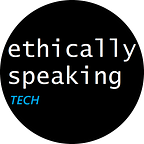What are ethics?
A google search will give you the following result -
moral principles that govern a person’s behaviour or the conducting of an activity.
the branch of knowledge that deals with moral principles.
(taken from Oxford languages)
Ethics aren’t universal law. It is a social construct. One that can be used for the betterment of society.
Ethics, also called moral philosophy, the discipline concerned with what is morally good and bad and morally right and wrong. The term is also applied to any system or theory of moral values or principles.
Ethics were born from philosophy. There are different branches of philosophy dealing with different aspects of ethics — Normative ethics, Meta-ethics and Applied ethics.
I will concern my blog and videos with applied ethics, which are needed in everyday life and can be easily understood because they deal with practical situations. Although ethics, being a human-made concept, are subjective they can be used as guidelines to create a better world if they are debated, discussed with all concerning parties and accordingly modified.
I prefer not to connect ethics with religious institutions, neither with any specific political theory even though every religion has guidelines for what it considers a moral conduct. As I said, ethics are subjective. I can choose my set of principles to follow if I don’t like what is being taught to me. Moral good and bad will be then decided by the result of my actions. So, although the definition infringes on some gray areas and is open to interpretation, ethics do form an important part of our lives. Living ethically, and thinking of moral good of everyone around you can lead to a positive environment at work and at home.
Although I am skeptical about there ever being a universal code of ethics, to which everyone can adhere without discrimination and without disapproval, ethical living can be practiced by individuals to create better communities for all of its members, and even for the ones arriving from outside.
To prevent cases of discrimination and marginalization, an individual must keep questioning the norms, and keep asking themselves whether the principles they follow as the part of a community align with their principles? Or have they been blindly following practices because they trusted a community when it was founded and hadn’t bothered to question the authority since ?
Ethical actions require more than just thoughts and feelings. They also require correct data on which those actions can be based. They also require experimentation and evidence. Something isn’t ethical just because I feel that way. For it to be ethical, it must show positive results without taking away something critical in return. With changing times, ethical standards should be reviewed and every new step taken must be contested not just on scientific grounds but also on its ethical aspects.
